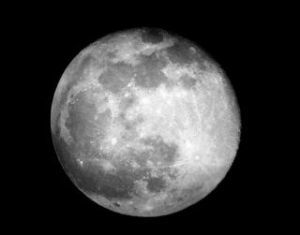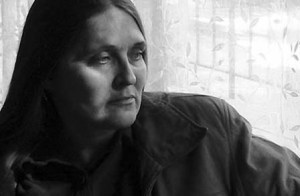Ned Hayes's Blog, page 4
June 1, 2020
Poem: what they did yesterday afternoon, by Warsan Shire
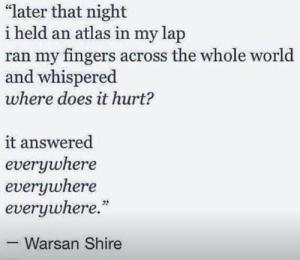 Poem: what they did yesterday afternoon,
Poem: what they did yesterday afternoon,by Warsan Shire
these are what my prayers look like;
dear god
i come from two countries
one is thirsty
the other is on fire
both need water.
later that night
i held an atlas in my lap
ran my fingers across the whole world
and whispered
where does it hurt?
it answered
everywhere
everywhere
everywhere.
Poem: what they did yesterday afternoon, by Warsan Shire was originally published on Ned Hayes
May 27, 2020
River of Words
River of Words is the most recent dramatic monologue written and performed by me, for St. David’s Episcopal Church in Portland Oregon for the Easter Vigil Service in April 2020.
The piece is based on the Hebrew Bible story of Mose’s Exodus.
River of Words was originally published on Ned Hayes
April 29, 2020
Poem: Darkness
 Placing your foot in a bucket of darkness,
Placing your foot in a bucket of darkness,
three miles to home: ostrich farm, oat field
pimpled with buttonweed, Rayleigh Scattering dissolved
by mist above. Two hours you spent rivering
a womb-humid artery for floodwater to pass through
& now passage back through steamy membrane of June.
Language between a mother & father on a lit porch
densely sways like a horse bowing but not grazing.
You pass, imagine them saying, “Night is a combine
& we sit like field stones waiting to be scooped up,
rimracking the whole machine.” Anything can be transmitted
over this open frequency, poem, grocery list, prayer, divorce.
She might confess, “Jeffery, I love myself,
yet when it is my turn to speak, I have nothing to say.”
 In a glade scoured clean of light, the span moon makes
In a glade scoured clean of light, the span moon makes
can be covered over by a fingernail; a hornet’s nest’s worth
of cold in the lungs would be worth all the Seyfert
Galaxy. Past the house, coffin-long trajectories
of spit precede unsure footing. You whisper
your earliest memory of song which held no rhythm,
no harmony, only waverings of voice-litany of sweat
& sawfly, ditch of ragweed you seem to be sinking in to.
Only dark & those restless, unfractured sounds tensing night
do you allow yourself to be sure of-boozy drawl of bees,
wet cricket flex, hollow-noted organ of a train running the line
to a country eroded, rinsed clean, even now.
-Andrew Grace
Poem: Darkness was originally published on Ned Hayes
April 1, 2020
Poem: A Litany in Time of Plague
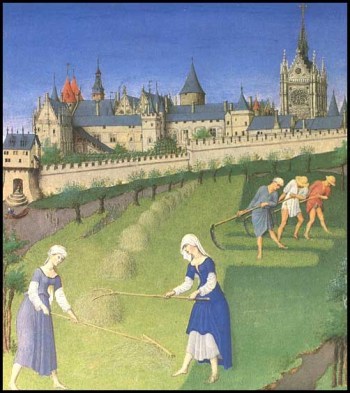 A Litany in Time of Plague (1600)
A Litany in Time of Plague (1600)Adieu, farewell, earth’s bliss;
This world uncertain is;
Fond are life’s lustful joys;
Death proves them all but toys;
None from his darts can fly;
I am sick, I must die.
Lord, have mercy on us!
Rich men, trust not in wealth,
Gold cannot buy you health;
Physic himself must fade.
All things to end are made,
The plague full swift goes by;
I am sick, I must die.
Lord, have mercy on us!
Beauty is but a flower
Which wrinkles will devour;
Brightness falls from the air;
Queens have died young and fair.
Dust hath closed Helen’s eye.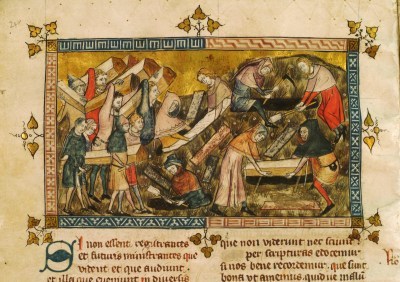
I am sick, I must die.
Lord, have mercy on us!
Strength stoops unto the grave,
Worms feed on Hector brave;
Swords may not fight with fate,
Earth still holds *ope her gate.
“Come, come!” the bells do cry.
I am sick, I must die.
Lord, have mercy on us!
Wit with his wantonness
Tasteth death’s bitterness;
Hell’s executioner
Hath no ears for to hear
What vain art can reply.
I am sick, I must die.
Lord, have mercy on us!
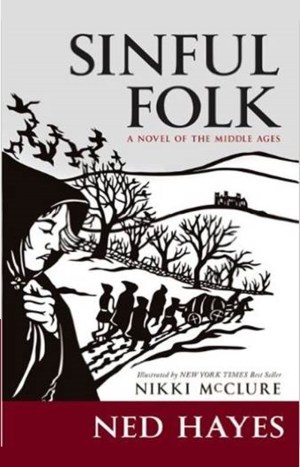 Haste, therefore, each degree,
Haste, therefore, each degree,
To welcome destiny;
Heaven is our heritage,
Earth is but a player’s stage;
Mount we unto the sky.
I am sick, I must die.
Lord, have mercy on us!
Thomas Nashe (1567 – 1601)
Poem: A Litany in Time of Plague was originally published on Ned Hayes
March 18, 2020
Poem: Full Moon, March 2020
Full Moon March 2020
Ted Kooser (former US poet laureate)
The moon was in self-isolation, too,
and wearing a white mask as it passed us
in an aisle of the night, keeping a distance
not acknowledging us. It was pushing
a cart heaped up with stars, far more stars
than any moon could ever need, the cart
sparkling, a few little stars falling out,
left behind as the moon rolled past,
on its way towards eternity’s checkout.

Poem: Full Moon, March 2020 was originally published on Ned Hayes
March 16, 2020
THIS SIDE OF PARADISE: A LETTER FROM F. SCOTT FITZGERALD, QUARANTINED IN THE SOUTH OF FRANCE

f. scott fitzgerald in the late 1920s.
(the best quarantine-themed literary parody from McSweeney’s Internet Tendency)
Dearest Rosemary,
It was a limpid dreary day, hung as in a basket from a single dull star. I thank you for your letter. Outside, I perceive what may be a collection of fallen leaves tussling against a trash can. It rings like jazz to my ears. The streets are that empty. It seems as though the bulk of the city has retreated to their quarters, rightfully so. At this time, it seems very poignant to avoid all public spaces. Even the bars, as I told Hemingway, but to that he punched me in the stomach, to which I asked if he had washed his hands. He hadn’t. He is much the denier, that one. Why, he considers the virus to be just influenza. I’m curious of his sources.
The officials have alerted us to ensure we have a month’s worth of necessities. Zelda and I have stocked up on red wine, whiskey, rum, vermouth, absinthe, white wine, sherry, gin, and lord, if we need it, brandy. Please pray for us.
You should see the square, oh, it is terrible. I weep for the damned eventualities this future brings. The long afternoons rolling forward slowly on the ever-slick bottomless highball. Z. says it’s no excuse to drink, but I just can’t seem to steady my hand. In the distance, from my brooding perch, the shoreline is cloaked in a dull haze where I can discern an unremitting penance that has been heading this way for a long, long while. And yet, amongst the cracked cloudline of an evening’s cast, I focus on a single strain of light, calling me forth to believe in a better morrow.
Faithfully yours,
F. Scott Fitzgerald
(the best quarantine-themed literary parody from McSweeney’s Internet Tendency)
THIS SIDE OF PARADISE: A LETTER FROM F. SCOTT FITZGERALD, QUARANTINED IN THE SOUTH OF FRANCE was originally published on Ned Hayes
December 31, 2019
365 Books by Women Authors
For over a century, International Women’s Day has been observed — and this year, the New York Public Library blog has compiled 365 books by women authors from across the globe to keep the celebration going all year long. I’ll be posting one book from this list every day of 2020 — and I hope you find some old favorites and some new discoveries. And I hope that readers can draw strength and inspiration from these 365 books — and the women who wrote them — in the year ahead.
 Here’s the NYPL List, which includes a vast range of women authors.
Here’s the NYPL List, which includes a vast range of women authors.
And if you’ve ever heard someone say they “just couldn’t find” a great woman author to read, now you have not one, but 365 suggestions.
1. Leila Aboulela, The Kindness of Enemies
2. Susan Abulhawa, The Blue Between Sky and Water
3. Chimamanda Ngozi Adichie, Half of a Yellow Sun
4. Etel Adnan, Sea and Fog
5. Marjorie Agosín, A Cross and a Star
6. Ama Atta Aidoo, An Angry Letter in January and Other Poems
7. Naja Marie Aidt, Rock, Paper, Scissors
8. Anna Akhmatova, The Complete Poems of Anna Akhmatova
9. Michelle Alexander, The New Jim Crow
10. Elizabeth Alexander, The Light of the World
11. Svetlana Alexievich, Voices From Chernobyl
12. Clare Allan, Poppy Shakespeare
13. Sarah Addison Allen, Lost Lake
14. Isabel Allende, Eva Luna
15. Ruth Almog, Death in the Rain
16. Karin Altenberg, Island of Wings
17. Julia Alvarez, In the Time of the Butterflies
18. Tahmima Anam, The Good Muslim
19. Maya Angelou, I Know Why The Caged Bird Sings
20. Katerina Anghelaki-Rooke, Being and Things On Their Own
21. Natacha Appanah, The Last Brother
22. Hannah Arendt, Responsibility and Judgment
23. Chloe Aridjis, Asunder
24. Bridget Asher, All of Us and Everything
25. Margaret Atwood, Oryx & Crake
26. Jane Austen, Pride and Prejudice
27. Mona Awad, 13 Ways of Looking At a Fat Girl
28. Basma Abdel Aziz, The Line
29. Mariama Bâ, Scarlet Song
30. Annie Baker, The Flick
31. Toni Cade Bambara, Those Bones Are Not My Child
32. Sara Baume, Spill Simmer Falter Wither
33. Jo Ann Beard, The Boys of My Youth
34. Gioconda Belli, The Inhabited Woman
35. Karen Bender, Refund
36. Fatima Bhutto, The Shadow of the Crescent Moon
37. Imogen Binnie, Nevada
38. Elizabeth Bishop, Geography III
39. Karen Blixen, Out of Africa
40. Katherine Boo, Behind the Beautiful Forevers
41. Lluba Merlina Bortolani, The Siege
42. Carmen Boullosa, Before
43. Charlotte Bronte, Jane Eyre
44. Emily Bronte, Wuthering Heights
45. Gwendolyn Brooks, The Bean Eaters
46. Lauren Buekes, The Shining Girls
47. NoViolet Bulawayo, We Need New Names
48. Octavia Butler, Kindred
49. Judith Butler, Gender Trouble: Feminism and the Subversion of Identity
50. Leonora Carrington, The hearing trumpet
51. Anne Carson, Nox
52. Ana Castillo, Black dove : mamá, mi’jo, and me
53. Theresa Hak Kyung Cha, Dictee
54. Eileen Chang, Half a Lifelong Romance
55. Jade Chang, The Wangs vs. The World
56. Paulina Chiziane, The First Wife
57. Susan Choi, American Woman
58. Kate Chopin, The Awakening
59. Sonya Chung, Long for This World
60. Caryl Churchill, Top Girls
61. Sandra Cisneros, Loose Woman
62. Hélène Cixous, The Hélène Cixous Reader
63. Lucille Clifton, Mercy
64. Colette, Cheri
65. Lindsey Collen, The Rape of Sita
66. Simin Daneshvar, Sutra & Other Stories
67. Tsitsi Dangarembga, Nervous Conditions
68. Edwidge Danticat, Claire of the Sea Light
69. Meaghan Daum, Unspeakable
70. Lydia Davis, The Collected Stories of Lydia Davis
71. Dola de Jong, The Tree and the Vine
72. Grazia Deledda, After the Divorce
73. Kiran Desai, The Inheritance of Loss
74. Anita Desai, Clear Light of Day
75. Shashi Deshpande, Writing from the Margin and Other Essays
76. Marosa di Giorgio, Diadems: Selected Poems
77. Viola Di Grado, Hollow Heart
78. Emily Dickinson, The Poems of Emily Dickinson
79. Joan Didion, Democracy
80. Dolores Dorantes, Style
81. Rita Dove, On the Bus With Rosa Parks
82. Carol Ann Duffy, The Bees
83. Emiliya Dvoryanova, Concerto for sentence
84. Yasmine El Rashidi, Chronicle of a Last Summer
85. Nawal El Saadawi, Woman at Point Zero
86. George Eliot, Middlemarch
87. Mona Eltahawy, Headscarves and Hymens: Why the Middle East Needs a Sexual Revolution
88. Buchi Emecheta, The Joys of Motherhood
89. Amy Krouse Rosenthal, Textbook
90. Louise Erdrich, LaRose
91. Laura Esquivel, Pierced by the sun
92. Tarfia Faizullah, Seam
93. Athena Farrokhzad, White Blight
94. Melissa Febos, Abandon Me
95. Leslie Feinberg, Stone Butch Blues
96. Elena Ferrante, My Brilliant Friend
97. Rosario Ferré, Memoir
98. Anne Finger, Call Me Ahab
99. Penelope Fitzgerald, The Blue Flower
100. Melissa Fleming, A Hope More Powerful than the Sea: One Refugee’s Incredible Story of Love, Loss, and Survival
101. Leontia Flynn, Profit and Loss
102. Paula Fox, Desperate Characters
103. Lauren Francis-Sharma, Til the Well Runs Dry
104. Ru Freeman, On Sal Mal Lane
105. Rivka Galchen, Atmospheric Disturbances
106. Mary Gaitskill, The Mare
107. Petina Gappah, The Book of Memory
108. Elena Garro, First love ; &, Look for my obituary
109. Roxane Gay, Bad Feminist
110. Ruby Langford Ginibi, Haunted by the Past
111. Janine di Giovanni, The Morning They Came for Us
112. Patricia Glinton-Meicholas, A Shift In the Light
113. Angela Mangalang Gloria, The Complete Poems of Angela Mangalang Gloria
114. Louise Gluck, Faithful and Virtuous Night
115. Nadine Gordimer, The Conservationist
116. Jorie Graham, Erosion
117. Linda LeGarde Grover, The dance boots
118. Paula Gunn Allen, America the Beautiful: Last Poems
119. Yaa Gyasi, Homegoing
120. Fariba Hachtroudi, The Man Who Snapped His Fingers
121. Marilyn Hacker, Names
122. Katori Hall, The Mountaintop
123. Radclyffe Hall, The Well of Lonliness
124. Barbara Hammer, Hammer!
125. Lorraine Hansberry, A Raisin in the Sun
126. Githa Hariharan, Almost Home: Finding a Place in the World from Kashmir to New York
127. Joy Harjo, Conflict Resolution for Holy Beings
128. Eve Harris, The Marrying of Chani Kaufman
129. Saidiya Hartman, Lose Your Mother: A Journey Along the Atlantic Slave Route
130. Shirley Hazzard, The Transit of Venus
131. Bessie Head, The Collector of Treasures
132. Amy Hempel, Reasons to Live
133. Cristina Henriquez, The Book of Unknown Americans
134. Christine Dwyer Hickey, The Cold Eye of Heaven
135. Akiko Higashimura, Princess Jellyfish
136. Patricia Highsmith, The Price of Salt
137. Hilda Hilst, With My Dog Eyes
138. Arlie Hochschild, The Second Shift
139. Alice Hoffman, Survival Lessons
140. Linda Hogan, Mean Spirit
141. Sara Sue Hoklotubbe, Deception on All Accounts
142. bell hooks, Feminism is for Everybody: Passionate Politics
143. Jodie Houser, Faith
144. Keri Hulme, The Bone People
145. Dương Thu Hương, Paradise of the Blind
146. Hồ Xuân Hương, Spring Essence
147. Zora Neale Hurston, Their Eyes Were Watching God
148. Ulfat Idilbi, Grandfather’s Tale
149. Naomi Jackson, The Star Side of Bird Hill
150. Margo Jefferson, Negroland
151. Elfriede Jelinek, Women As Lovers
152. Gish Jen, Typical American
153. Amryl Johnson, Sequins For a Ragged Hem
154. June Jordan, Directed by Desire
155. Janine Joseph, Driving Without a License
156. Mieko Kanai, The Word Book
157. Han Kang, The Vegetarian
158. Ghada Karmi, Return: A Palestinian Memoir
159. Mary Karr, The Liar’s Club
160. Kazue Kato, Blue Exorcist
161. Rupi Kaur, Milk and Honey
162. Hiromi Kawakami, Manazuru
163. Porochista Khakpour, The Last Illusion
164. Ausma Zehanat Khan, The Unquiet Dead
165. Vénus Khoury-Ghata, A House at the Edge of Tears
166. Suki Kim, Without You, There Is No Us
167. Jamaica Kincaid, See Now Then
168. Barbara Kingsolver, The Poisonwood Bible
169. Maxine Hong Kingston, The Woman Warrior
170. Natsuo Kirino, Out
171. Katie Kitamura, Gone to the Forest
172. Elizabeth Kolbert, The Sixth Extinction: An Unnatural History
173. Anna Kordzaia-Samadashvili, Me, Margarita
174. Sana Krasikov, One More Year
175. Megan Kruse, Call Me Home
176. Jean Kwok, Girl in Translation
177. Kang Kyong-ae, From Wonso Pond
178. Selma Lagerlöf, A Manor House Tale
179. Yanick Lahens, The Colour of Dawn
180. Jhumpa Lahiri, The Lowland
181. Laila Lalami, Secret Son
182. Nella Larsen, Passing
183. Jeanne Marie Laskas, Concussion
184. Radmila Lazic, A Wake for the Living
185. Ursula K. Le Guin, The Left Hand of Darkness
186. Adrian Nicole LeBlanc, Random Family
187. Harper Lee, To Kill A Mockingbird
188. Jill Leovy, Ghettoside
189. Robin Coste Lewis, Voyage of the Sable Venus and Other Poems
190. Yiyun Li, Kinder Than Solitude
191. Rosa Liksom, Compartment No. 6
192. Adriana Lisboa, Crow Blue
193. Gloria Lisé, Departing at Dawn
194. Clarice Lispector, The Hour of the Star
195. Marjorie Liu, Monstress: Awakening
196. Inverna Lockpezer, Cuba: My Revolution
197. Joan London, The Golden Age
198. Audre Lorde, The Collected Poems of Audre Lorde
199. Dulce Maria Loynaz, Absolute Solitude
200. Valeria Luiselli, Sidewalks
201. Fiona Maazel, Woke Up Lonely
202. Suah Mae, A Greater Music
203. Nguyen Phan Que Mai, The Secret of Hoa Sen
204. Janet Malcolm, Forty-one False Starts
205. Alia Mamdouh, The Loved Ones
206. Dacia Maraini, The Silent Duchess
207. Dawn Lundy Martin, Life In A Box Is A Pretty Life
208. Bobbie Ann Mason, Clear Springs
209. Ronit Matalon, The Sound of Our Steps
210. Ayana Mathis, The Twelve Tribes of Hattie
211. Jane Mayer, Dark Money
212. Imbolo Mbue, Behold the Dreamers
213. Eimear McBride, A Girl Is a Half-Formed Thing
214. Carson McCullers, The Heart is a Lonely Hunter
215. Charlotte McDonald-Gibson, Cast Away
216. Francesca Melandri, Eva Sleeps
217. Rigoberta Menchu, I, Rigoberta Menchu
218. Claire Messud, The Woman Upstairs
219. Ai Mi, Under the Hawthorn Tree
220. Jung Mi-kyung, My Son’s Girlfriend
221. Qiu Miaojin, Last Words From Monmartre
222. Amanda Michalopoulou, Why I Killed My Best Friend
223. Lydia Millet, Sweet Lamb of Heaven
224. Gabriela Mistral, Selected Poems of Gabriela Mistral
225. Minae Mizumura, A True Novel
226. Nadifa Mohamed, Black Mamba Boy
227. Lorrie Moore, Bark
228. Marianne Moore, The Poems of Marianne Moore
229. Cherrie Moraga, Heroes and Saints & Other Plays
230. Nancy Morejón, Querencias/Homing Instincts
231. Toni Morrison, Sula
232. Scholastique Mukasonga, Cockroaches
233. Bharati Mukherjee, The Tree Bride
234. Herta Müller, The Land of Green Plums
235. Alice Munro, Family Furnishings
236. Iris Murdoch, A Severed Head
237. Eileen Myles, School of Fish
238. Azar Nafisi, The Republic of Imagination: America in Three Books
239. Maggie Nelson, Bluets
240. Guadalupe Nettel, Natural Histories
241. Celeste Ng, Everything I Never Told You
242. Hualing Nieh, Mulberry and Peach
243. Dorthe Nors, Karate Chop
244. Sara Nović, Girl at War
245. Alissa Nutting, Tampa
246. Adaobi Tricia Nwaubani, I Do Not Come to You by Chance
247. Joyce Carol Oates, Black Water
248. Silvia Ocampo, Thus Were Their Faces
249. Yoko Ogawa, Revenge
250. Nnedi Okorafor, Binti
251. Chinelo Okparanta, Happiness, Like Water
252. Sharon Olds, What Love Comes To
253. Yewande Omotoso, The Woman Next Door
254. Wendy C. Ortiz, Excavation
255. Julie Otsuka, The Buddha in the Attic
256. Helen Oyeyemi, Mr. Fox
257. Kaori Ozaki, The Gods Lie
258. Ruth Ozeki, All Over Creation
259. Cynthia Ozick, Foreign Bodies
260. ZZ Packer, Drinking Coffee Elsewhere
261. Grace Paley, The Little Disturbances of Man
262. Morgan Parker, There Are More Beautiful Things Than Beyonce
263. Suzan-Lori Parks, Topdog/Underdog
264. Shahrnush Parsipur, Kissing the Sword
265. Ann Patchett, Bel Canto
266. Sylvia Plath, The Bell Jar
267. Anna Politkovskaya, A Russian Diary
268. Katha Pollitt, Pro: Reclaiming Abortion Rights
269. Dorit Rabinyan, All the Rivers
270. Dawn Raffel, Carrying the Body
271. Claudia Rankine, Citizen
272. Laura Restrepo, Isle of Passion
273. Parisa Reza, The Gardens of Consolation
274. Jean Rhys, Wide Sargasso Sea
275. Adrienne Rich, Collected Poems, 1950-2012
276. Alifa Rifaat, Distant View of a Minaret and Others Stories
277. Suzanne Rivecca, Death Is Not An Option
278. Riverbend, Baghdad Burning
279. Rahna Reiko Rizzuto, Hiroshima in the Morning
280. Merce Rodoreda, The Time of the Doves
281. Arundhati Roy, The God of Small Things
282. Vedrana Rudan, Night
283. Mary Ruefle, The Most of It
284. Dale Russakoff, The Prize
285. Nelly Sachs, Glowing Enigmas
286. Elif Şafak, Ask
287. Trish Salah, Wanting in Arabic
288. Sonia Sanchez, Does Your House Have Lions?
289. Sappho, The Complete Works of Sappho
290. Noo Saro-Wiwa, Looking for Transwonderland: Travels in Nigeria
291. Marjane Satrapi, Persepolis
292. Åsne Seierstad, The Angel of Grozny
293. Shanthi Sekaran, Lucky Boy
294. Julia Serano, Excluded: Making Feminist and Queer Movements More Inclusive
295. Anne Sexton, The Complete Poems of Anne Sexton
296. Sonia Shah, Pandemic: Tracking Contagions from Cholera to Ebola and Beyond
297. Kamila Shamsie, Kartography
298. Ntozake Shange, Freedom’s A-Calling Me
299. Solmaz Sharif, Look
300. Murasaki Shikibu, The Tale of Genji
301. Kyung-sook Shin, Please Look After Mom
302. Sun Yung Shin, Unbearable Splendor
303. Sei Shonagon, The Pillow Book
304. Ana Maria Shuah, The Weight of Temptation
305. Bapsi Sidhwa, Ice-Candy Man
306. Leslie Marmon Silko, Almanac of the Dead
307. Zadie Smith, Swing Time
308. Tracy K. Smith, Life on Mars
309. Betty Smith, A Tree Grows in Brooklyn
310. Marivi Soliven, The Mango Bride
311. Rebecca Solnit, A Field Guide to Getting Lost
312. Susan Sontag, Styles of Radical Will
313. Ahdaf Soueif, The Map of Love
314. Gertrude Stein, Fernhurst, Q.E.D., and other early writings
315. Ruth Stone, What Love Comes To
316. Aoibbhean Sweeney, Among Other Things, I’ve Taken Up Smoking
317. Mary Szybist, Incarnadine
318. Wislawa Szymborska, Monologue of a Dog
319. Elizabeth Crane, When the Messenger Is Hot
320. Amy Tan, The Valley of Amazement
321. Yoko Tawada, Memoirs of a Polar Bear
322. Valerie Taylor, The Girls in 3-B
323. Teffi, Memories: From Moscow to the Black Sea
324. Lygia Fagunda Telles, The Girl in the Photograph
325. Ece Temelkuran, Book of the Edge
326. Lynne Tillman, No Lease on Life
327. Taeko Tomioka, Building Waves
328. Tereska Torres, By Cecile
329. Monique Truong, The Book of Salt
330. Marina Tsvetaeva, Moscow in the Plague Year
331. Magdalena Tulli, In Red
332. Dubravka Ugresic, Thank You For Not Reading
333. Sigrid Undset, Gunnar’s Daughter
334. Chika Unigwe, On Black Sisters Street
335. Kirstin Valdez Quade, Night at the Fiestas
336. Jean Valentine, Little Boat
337. Lara Vapnyar, There Are Jews in My House
338. Marja-Liisa Vartio, The Parson’s Widow
339. Josefina Vicens, The Empty Book
340. Alice Walker, The Color Purple
341. Park Wan-suh, Lonesome You
342. Jesmyn Ward, Men We Reaped
343. Sarah Waters, Fingersmith
344. Shannon Watters, Lumberjanes
345. Laurie Weeks, Zipper Mouth
346. Eudora Welty, The Optimist’s Daughter
347. Phyllis Wheatley, The Poetry of Phyllis Wheatley
348. Zoe Wicomb, You Can’t Get Lost In Cape Town
349. Joy Williams, The Visiting Privilege
350. G. Willow Wilson, Ms. Marvel
351. Charlotte Wood, The Natural Way of Things
352. Virginia Woolf, Orlando
353. Alexis Wright, Carpentaria
354. Sarah E. Wright, This Child’s Gonna Live
355. Sylvia Wynter, The Hills of Hebron
356. Xuē Xīnrán, The Good Women of China
357. Can Xue, The Last Lover
358. Tiphanie Yanique, Land of Love and Drowning
359. Samar Yazbek, Cinnamon
360. Banana Yoshimoto, Kitchen
361. Monica Youn, Barter
362. Kang Young-sook, Rina
363. Hsia Yu, Salsa
364. Jessica Zafra, Twisted
365. Haifa Zangana, Dreaming of Baghdad
(List compiled by Gwen Glazer, Sara Beth Joren, Lynn Lobash, Tracy O’Neill, and Nicholas Parker. )

365 Books by Women Authors was originally published on Ned Hayes
December 14, 2019
The Ghost Stories of Charles Dickens
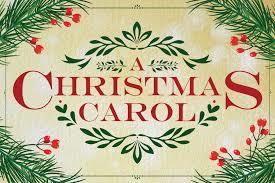 The holiday season sees a million variations on Charles Dickens’s classic A Christmas Carol, yet this marvelous supernatural tale all too often overshadows the ghostly echoes that permeate Dickens’s entire oeuvre. Here’s a brief overview.
The holiday season sees a million variations on Charles Dickens’s classic A Christmas Carol, yet this marvelous supernatural tale all too often overshadows the ghostly echoes that permeate Dickens’s entire oeuvre. Here’s a brief overview.In John Irving’s book of personal essays, Saving Piggy Sneed, he describes living with the Great Royal Circus in northwest India. One evening, after a circus performance, he was surprised to see children entranced by a televised version of Dickens’s A Christmas Carol. These Hindu children didn’t celebrate Christmas, yet they knew the story well – it was “their favorite ghost story.”
We think of A Christmas Carol as the preeminent story of the holidays, but at heart, it’s a ghost story. Dickens told us this fact in his little preface:
I have endeavored, in this Ghostly little book, to raise the ghost of an idea [in] my readers… may it haunt their houses pleasantly.
Christmas Carol is not Dickens’s only eerie tale. In fact, Charles Dickens grew up with ghost stories and he told them everywhere. He told talked of the supernatural as an integral part of the engine that drove his storytelling. “Dickens’s celebration of ghosts,” writes Irving, “…is but a small part of the author’s abiding faith in the innocence and magic of childhood.” For those of us who know Dickens well, ghosts seem to be ever present.
Ghosts first appear in Pickwick Papers, Dickens’s episodic novel. This early book features Mr. Pickwick, Alfred Jingle, Serjeant Buzfuz, Sammer, The Fat Boy, Mr. Winkle and more (doesn’t Dickens have marvelous character names? They’re better than anything in the Simpsons). Embedded in Pickwick Papers is a story called ‘The Lawyer & the Ghost’. There are also multiple tales told by The One-Eyed Bagman – first is ‘The Queer Chair’, about a wayfarer haunted by unusual furniture, and then there’s ‘The Ghosts of the Mail,’ a story of a mail coach carrying unearthly passengers.
More ghostly tales haunt later sections of the Pickwick Papers. ‘A Madman’s Manuscript’ takes us into the insane realm of a man haunted by spectral presences (this psychological horror story would be right at home alongside John Langan’s or Laird Barron’s current work). And the last of the ghost stories in Pickwick points at the future: ‘The Story of the Goblins Who Stole a Sexton’ focuses on a miserly character on Christmas Eve who is woken from his curmudgeonly ways by a supernatural figure. The seeds of Scrooge were planted early!
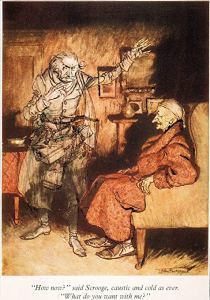
Nicholas Nickleby, Dickens’s third novel, also includes a pair of ghost stories. ‘The Five Sisters’ is a sad fable, while ‘Baron Koeldwethout’s Apparition’ is funny and entertaining during an otherwise slow part of the novel.
In 1843, after Nicholas Nicklebywas published, the idea of Christmas Carol came to Dickens in a flash and he scribbled it down in a frenzy. Christmas Carol combines the best of Dickens. It is not merely a ghost story, but also a comedic tale (like Pickwick) and a redemptive parable (like Nickleby or later, Oliver Twist) G.K. Chesterton, years later, summed up the appeal of the story: “A Christmas Carol is a happy story because it describes an abrupt and dramatic change… the story owes much of its hilarity to the fact of it being a tale of winter and of a very wintry winter. There is much about comfort in the story; yet the comfort is never enervating.”
After the success of Christmas Carol, Dickens kept writing Christmas-themed pieces, but it took 5 more years until he returned to ghosts. In 1848, he delivered The Haunted Man for the holidays. In this tale, a man named Redlaw is haunted by his past and again faces new decisions about his future. Redlaw is reminiscent of Scrooge, but the story doesn’t have the soft focus of Christmas Carol – there’s a harder and more malevolent edge to the ghostly visitation, and a sense of fear appropriate to a truly horrific paranormal story.
Yet Dickens never succumbed to the foreboding that haunted his characters. By 1850, he produced A Child’s Dream of a Star, the story of a girl ascended to heaven as an angel, who awaits the arrival of her brother. Many readers think this story gives insight into Dickens’s own childhood, specifically to his happy days at St. Mary’s, when he was lifted briefly out of deprivation. In the Dickensian, Walter Dexter mentions that “In A Child’s Dream of a Star, [Dickens] refers very touchingly to those days… From an upper window on one side of the house, the Church and Churchyard of St. Mary’s were visible, just as described in this charming story.”
That same year Dickens also produced a short piece called A Christmas Tree, in which he writes about the different types of ghosts one might encounter during the winter season. Other ghostly apparitions emerge in Dickens’ library of work, most published in magazines he edited. Those stories include ‘To Be Read at Dusk,’ ‘The Ghost Chamber’ (which Dickens himself described as “wild”) and ‘The Haunted House.’
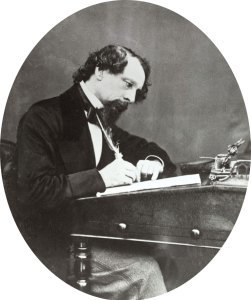 Following this period, Dickens wrote two “serious” novels – Great Expectations and Our Mutual Friend. But he followed up that literary heavy lifting with two quick short ghost stories – ‘Trial for Murder’ and ‘The Signal-Man.’ The first one is a fantastic atmospheric piece about a man on a jury who is haunted by the murdered man. It’s also interesting to note that the second one – ‘Signal-Man’ – was thought by many readers to have been based on a real apparition, one which made the headlines for years in the United Kingdom. There are many other ghostly stories that have been variously attributed to Dickens, but the final haunting novel that Dickens claimed as his own was his “spooky” and unfinished last work, The Mystery of Edwin Drood.
Following this period, Dickens wrote two “serious” novels – Great Expectations and Our Mutual Friend. But he followed up that literary heavy lifting with two quick short ghost stories – ‘Trial for Murder’ and ‘The Signal-Man.’ The first one is a fantastic atmospheric piece about a man on a jury who is haunted by the murdered man. It’s also interesting to note that the second one – ‘Signal-Man’ – was thought by many readers to have been based on a real apparition, one which made the headlines for years in the United Kingdom. There are many other ghostly stories that have been variously attributed to Dickens, but the final haunting novel that Dickens claimed as his own was his “spooky” and unfinished last work, The Mystery of Edwin Drood.
Over the years, I’ve loved reading deeply of Dickens’s oeuvre. It’s amusing and encouraging to realize that such a venerated novelist enjoyed his “childish” ghost stories. In our world today, Dickens would probably be considered a “genre” novelist because he enjoys three things that aren’t found in most of today’s ‘literary’ fiction — broad caricature, a sense of hopefulness (what we’d call ‘sentimentality’ today), and of course, those voices-from-beyond-the-grave that permeate his work. Dickens’s work is full of spooky happenings. His ability to see beyond the mundane and see the inspiration in the ghostly is what makes him such a universally loved storyteller.
FOOTNOTES
Irving was in India doing research for his 1994 novel Son of the Circus.
See Peter Haining’s introduction to The Complete Ghost Stories of Charles Dickens for the exact citation.
A Christmas Tree was published in Household Words, the magazine Dickens edited for many years.
Dan Simmons’s novel Drood was my Christmas read a few seasons ago. Simmons novel is a marvelous tale of spooky happenings and obsessions in Dickens’s own life, narrated by his rival and friend Wilkie Collins. Drood tries to explain the sequence of events that may have inspired Dickens’s last work.
The Ghost Stories of Charles Dickens was originally published on Ned Hayes
December 13, 2019
Poem: Journey of the Magi (Read by T.S. Eliot)
A cold coming we had of it,
Just the worst time of the year
For a journey, and such a long journey:
The ways deep and the weather sharp,
The very dead of winter.’
And the camels galled, sorefooted, refractory,
Lying down in the melting snow.
There were times we regretted
The summer palaces on slopes, the terraces,
And the silken girls bringing sherbet.
Then the camel men cursing and grumbling
and running away, and wanting their liquor and women,
And the night-fires going out, and the lack of shelters,
And the cities hostile and the towns unfriendly
And the villages dirty and charging high prices:
A hard time we had of it.
At the end we preferred to travel all night,
Sleeping in snatches,
With the voices singing in our ears, saying
That this was all folly.
Then at dawn we came down to a temperate valley,
Wet, below the snow line, smelling of vegetation;
With a running stream and a water-mill beating the darkness,
And three trees on the low sky,
And an old white horse galloped away in the meadow.
Then we came to a tavern with vine-leaves over the lintel,
Six hands at an open door dicing for pieces of silver,
And feet kicking the empty wine-skins.
But there was no information, and so we continued
And arriving at evening, not a moment too soon
Finding the place; it was (you might say) satisfactory.
All this was a long time ago, I remember,
And I would do it again, but set down
This set down
This: were we led all that way for
Birth or Death? There was a Birth, certainly
We had evidence and no doubt. I had seen birth and death,
But had thought they were different; this Birth was
Hard and bitter agony for us, like Death, our death.
We returned to our places, these Kingdoms,
But no longer at ease here, in the old dispensation,
With an alien people clutching their gods.
I should be glad of another death.
T.S. Eliot, Collected Poems, 1909-1962 (Harcourt Brace Jovanovich, 1991).
This poem has been shared here under fair use guidelines provided by The Poetry Foundation.
Poem: Journey of the Magi (Read by T.S. Eliot) was originally published on Ned Hayes
November 27, 2019
Poem: America, I Sing Back
America, I Sing Back
for Phil Young, my father, Robert Hedge Coke, Whitman, and Hughes
America, I sing back. Sing back what sung you in.
Sing back the moment you cherished breath.
Sing you home into yourself and back to reason.
Oh, before America began to sing, I sung her to sleep,
held her cradleboard, wept her into day.
My song gave her creation, prepared her delivery,
held her severed cord beautifully beaded.
My song helped her stand, held her hand for first steps,
nourished her very being, fed her, placed her three sisters strong.
My song comforted her as she battled my reason
broke my long held footing sure, as any child might do.
Lo, as she pushed herself away, forced me to remove myself,
as I cried this country, my song grew roses in each tear’s fall.
My blood veined rivers, painted pipestone quarries
circled canyons, while she made herself maiden fine.
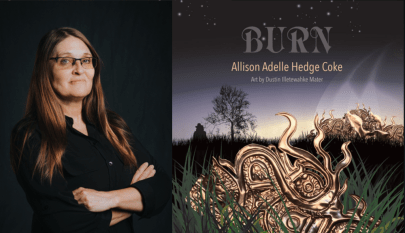 Oh, but here I am, here I am, here, I remain high on each and every peak,
Oh, but here I am, here I am, here, I remain high on each and every peak,
carefully rumbling her great underbelly, prepared to pour forth singing—
and sing again I will, as I have always done.
Never silenced unless in the company of strangers, singing
the stoic face, polite repose, polite, while dancing deep inside, polite
Mother of her world. Sister of myself.
When my song sings aloud again. When I call her back to cradle.
Call her to peer into waters, to behold herself in dark and light,
day and night, call her to sing along, call her to mature, to envision—
Then, she will make herself over. My song will make it so
When she grows far past her self-considered purpose,
I will sing her back, sing her back. I will sing. Oh, I will—I do.
America, I sing back. Sing back what sung you in.
Allison Adelle Hedge Coke was born in Amarillo, Texas, and grew up in North Carolina, Canada and on the Great Plains. Hedge Coke has worked in factories, tobacco fields, waters and the food service industry since early youth. She finished her GED at 16 years old and went on to study photography, traditional arts, and writing in community education classes at North Carolina State University..

[Read more Poetry Posts]
Poem: America, I Sing Back was originally published on Ned Hayes

